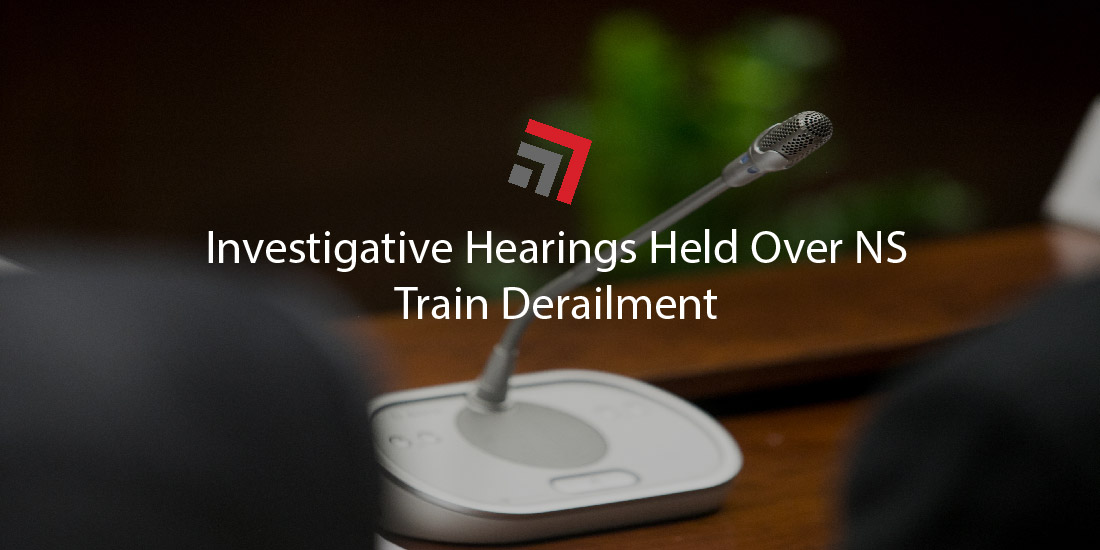On June 22 and 23 the National Transportation Safety Board (NTSB) held a hearing to investigate the February derailment of a Norfolk Southern (Class I Railroad) train in East Palestine, Ohio.
The public hearing, recorded on the NTSB’s YouTube page, took place at East Palestine High School where NTSB board members, investigators, and scheduled witnesses divulged their accounts of the derailment and subsequent environmental and health impacts.
Parties to the hearing also included Norfolk Southern (NS), the Federal Railroad Administration, and unions as well as village officials of East Palestine.
The agenda focused on four main items:
- Hazard Communications and Emergency Responder Preparedness for the Initial Emergency Response
- Circumstances that Led to the Decision to Vent and Burn Five Vinyl Chloride Tank Cars
- Freight Car Bearing Failure Modes and Wayside Detection Systems
- Tank Car Derailment Damage, Crashworthiness, and Hazardous Materials Package Information
Upon the hearing’s conclusion last Friday evening, the NTSB will use the information gathered and complete the investigation, determine probable cause, and make recommendations to improve overall transport safety, according to the federal agency’s news release.
The full investigation process is expected to take anywhere from one year to 18 months from the date of the accident to complete.
That means a verdict will likely be reached between February and July of 2024.
“Well, this what they want.”
Promptly before last week’s hearing, the NTSB released preliminary findings that insinuate NS supervisors didn’t address an engineer’s safety concerns before the train departed and eventually derailed.
According to the agency, the day before the accident, an engineer was concerned about the train’s size to which they alerted the yardmaster of. “You got 32 percent of the weight on the headend. 20 percent in the middle and 40 percent on the rearend, the engineer said. In other words, the train did not appear rule compliant to them.
In response, the engineer was told, “Well, this is what they want.”
Soon after the release, NS responded by saying the Federal Railroad Administration has not set out regulatory requirements on train configuration. Furthermore, the railroad argues the train met its internal policies on configuration at the time of the derailment.
Background on February’s derailment
Late evening on February 3, an NS freight train carrying cars of hazardous chemicals derailed in East Palestine, less than a mile near the Ohio-Pennsylvania border.
A couple hours later, NS reported the accident to the National Response Center and the EPA arrived on-site early next morning.
Of the 150 cars the train was hauling, about 50 of them were affected by the derailment. 20 of the cars contained hazardous materials, including vinyl chloride, a dangerous chemical where prolonged exposure can cause liver cancer.
Some of the hazmat cars caught fire and burned for over two days, while others spilled their toxic loads into an adjacent ditch that feeds tributaries of the Ohio River.
In order to prevent a deadly explosion, emergency crews had no choice but to conduct controlled burns of remaining hazmat material. While an explosion was averted, toxic chemicals were also released into the air, as a result.
Over the past several months, residents in and around East Palestine remain worried about everything from drinking water and air quality to whether their crops or livestock are contaminated.
Since the event, the public has been critical of NS’ perceived negligence while stakeholders are pressuring the railroad to both literally and metaphorically clean up its act.
The railroad has vowed to help affected communities, however it also has been vague when asked for direct specifics.
Concerns over home value, resident health, and the removal of hazmat material remain outstanding.
Final Thoughts
Amid this investigation, Norfolk Southern’s precision-scheduled railroading (PSR) model has been called into question.
While already controversial with unions before the accident, these groups representing railroad employees point to average inspection times decreasing while operating under the model.
In other words, they argue PSR may lead to a time crunch for maintenance inspections leading to potential oversights.
NS refuted these claims: “It’s not accurate to say NS has ‘reduced’ the standard amount of time for a car inspection since the implementation of PSR.”
Please contact us if you have any questions regarding this topic or any others in domestic logistics. In addition, stay up to date with weekly headlines from both trucking and rail via our Road Map newsletter.
More blogs similar to this:



Recent Comments